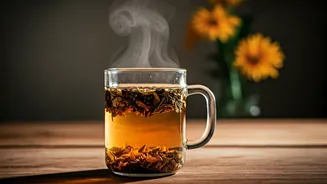The Tea Unveiled
Soha Ali Khan's shared tea recipe has captured attention as a potential home remedy for PMS cramps. Described as 'super easy,' the recipe's simplicity
and accessibility are key to its appeal. This is in contrast to more complicated or less accessible remedies that may not be as readily embraced. The ease of preparation makes it more likely that individuals experiencing discomfort might try it out. Moreover, the tea's presentation on social media likely contributed to its popularity, as it provides a relatable and approachable solution. The use of such a familiar platform offers a direct route for the recipe's dissemination, facilitating an easy way to learn about and share the remedy.
Ingredients & Preparation
The exact ingredients and preparation steps for Soha Ali Khan's tea recipe aren't explicitly detailed in the provided information, but the claim of being 'super easy' hints at minimal components and straightforward instructions. Generally, such remedies frequently leverage common ingredients that are often readily available in most kitchens. Herbs like ginger, known for its anti-inflammatory properties, or chamomile, valued for its calming effects, are possible candidates. Similarly, ingredients such as cinnamon, which can help regulate blood sugar, may be included. The lack of specific details highlights the importance of verifying the recipe's actual contents, as the efficacy of any natural remedy is intricately linked to its specific ingredients and their appropriate combination. In the absence of the full recipe, further research is suggested to fully understand the approach.
PMS and Its Challenges
Premenstrual Syndrome, commonly known as PMS, presents a range of symptoms that can impact a woman's physical and emotional well-being. Common physical symptoms include cramps, bloating, headaches, and breast tenderness. Emotional symptoms often involve mood swings, irritability, and anxiety. These symptoms may significantly disrupt daily activities. While the severity of PMS varies among women, effective management is vital for enhancing their quality of life. Various approaches, including lifestyle adjustments, over-the-counter medications, and natural remedies, are employed to alleviate PMS symptoms. Tailoring the treatment to individual needs is important for achieving optimum comfort and functionality during the premenstrual phase. The availability of readily accessible and effective methods is key in the treatment of PMS.
Natural Remedies Explored
Alongside conventional medicine, numerous natural remedies are used to manage PMS symptoms. Herbal teas, such as the one shared by Soha Ali Khan, are a common approach, offering potentially soothing effects. Dietary changes, such as reducing salt and sugar intake and increasing the consumption of fruits, vegetables, and whole grains, can also provide relief. Furthermore, regular exercise and stress management techniques are beneficial. These include yoga, meditation, and deep breathing exercises. The appeal of natural remedies lies in their potentially fewer side effects and accessibility, making them a favored alternative for many women. These options offer a more holistic strategy for PMS management, enhancing overall well-being during the premenstrual phase. Prioritizing these options allows for natural comfort and enhanced daily life.
Soha's Recipe Relevance
Soha Ali Khan's sharing of a tea recipe aligns with the growing trend of utilizing easily accessible home remedies for health concerns. In this context, the shared recipe acts as a practical and straightforward option for easing PMS symptoms. This approach promotes simplicity and a do-it-yourself mindset. By sharing her experience, Soha Ali Khan not only gives a remedy but also encourages open communication about women's health. This type of sharing is especially impactful due to the widespread use of social media by numerous women. This can contribute to increasing the awareness of PMS and also promotes the value of accessible and easy solutions. This aligns with a trend of wellness, where individuals take control of their health through simple practices.















